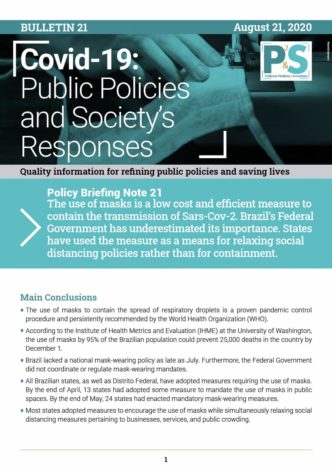Main Conclusions
- The use of masks to contain the spread of respiratory droplets is a proven pandemic control procedure and persistently recommended by the World Health Organization (WHO).
- According to the Institute of Health Metrics and Evaluation (IHME) at the University of Washington, the use of masks by 95% of the Brazilian population could prevent 25,000 deaths in the country by December 1.
- Brazil lacked a national mask-wearing policy as late as July. Furthermore, the Federal Government did not coordinate or regulate mask-wearing mandates.
- All Brazilian states, as well as Distrito Federal, have adopted measures requiring the use of masks. By the end of April, 13 states had adopted some measure to mandate the use of masks in public spaces. By the end of May, 24 states had enacted mandatory mask-wearing measures.
- Most states adopted measures to encourage the use of masks while simultaneously relaxing social distancing measures pertaining to businesses, services, and public crowding.
- The lack of enforcement, programs, and mass actions, along with disinformation, downgraded the importance of mask-wearing as well as the protection capacity of the most vulnerable population.
- In light of these events, counter to the experience of other countries, masks have ceased to be effective in Brazil, despite their low cost, and have had marginal impact in containing COVID-19 infection and death rates.
Work group responsible
Coordinators: Lorena Barberia (USP) and Tatiane C Moraes de Sousa (Fiocruz)
Researchers
- Luiz Guilherme Roth Cantarelli (DCP-USP)
- Maria Letícia Claro (DCP-USP and CEPESP/FGV)
- Isabel Seelaender Costa Rosa (DCP-USP)
- Pedro H. de Santana Schmalz (DCP-USP and CEPESP/FGV)
- Marcela Mello Zamudio (DCP-USP and CEPESP/FGV)


